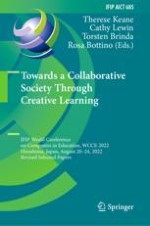2023 | OriginalPaper | Chapter
Symbiotic Approach of Mathematical and Computational Thinking
Authors : Kristin Parve, Mart Laanpere
Published in: Towards a Collaborative Society Through Creative Learning
Publisher: Springer Nature Switzerland
Activate our intelligent search to find suitable subject content or patents.
Select sections of text to find matching patents with Artificial Intelligence. powered by
Select sections of text to find additional relevant content using AI-assisted search. powered by
